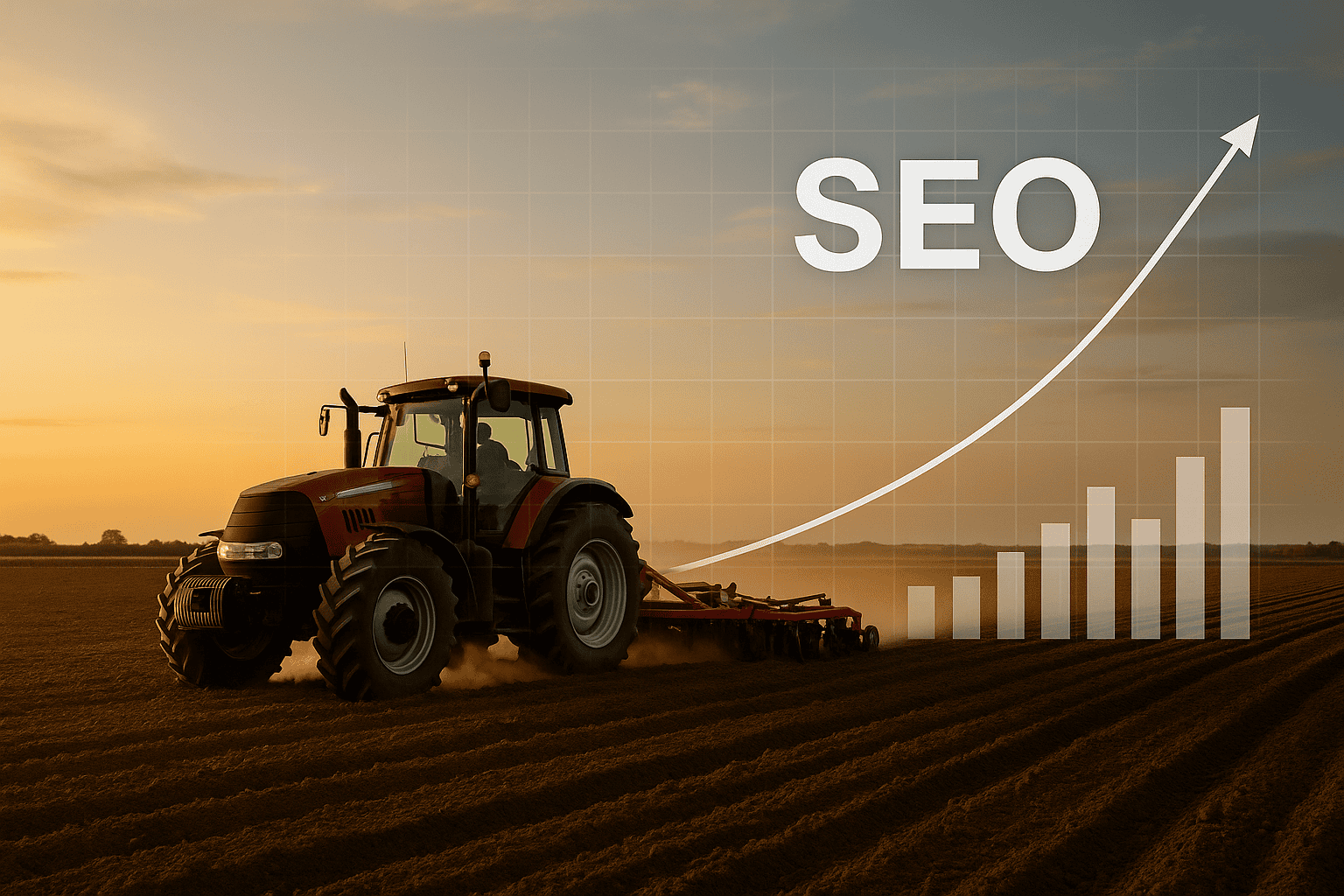Ever search for your own business on Google and find your competitors showing up first? That’s not just annoying—it’s costing you leads and sales.
If your website isn’t showing up when farmers are searching for equipment or services, bad SEO could be the reason. SEO—Search Engine Optimization—is what helps Google understand who you are and why your site should be seen first. If it’s not dialed in, your competitors will keep outranking you—even if their business isn’t better.
Today, we’ll break down:
- What SEO actually means (without the tech jargon)
- How bad SEO quietly hurts your business
- The exact steps ag businesses can take to fix it
If you’re tired of being buried in search results, this is where you start.
Why SEO Matters in Ag Marketing
Think about what a typical farmer does before calling you—they Google it. Whether it’s “best compact tractor for small farms” or “custom fertilizer application near me,” they’re making decisions based on who shows up first.
If your website isn’t on page one, you’re not even in the running.
That’s where SEO steps in. A well-optimized website will do the following:
- Helps you rank higher in search results
- Puts your business in front of farmers and ag professionals
- Drives more qualified traffic to your site
- Builds trust before anyone picks up the phone
How Bad SEO Hurts Your Business
You don’t have to be doing everything wrong for SEO to cost you. Even one or two weak areas—like slow site speed or missing keywords—can push you below the competition.
If your site:
- Loads slowly
- Isn’t mobile-friendly
- Doesn’t match what farmers are searching for
- Has weak or outdated content
- Isn’t linked to by other trustworthy sites
…then Google likely sees your competitors as more relevant.

Step-by-Step SEO fixes for Ag Businesses
1. Start with Keywords Farmers Actually Use
Use terms they’re typing into Google. Tools like Google Keyword Planner or SEMrush can help, but so can your own sales conversations.
Examples:
- best used tractors for sale
- seed tenders near me
- ag sprayers for small farms
- how to finance farm equipment
Use these naturally in your product pages, blog content, and headlines.
2. Clean Up Your On-Page SEO
Each page on your website should be built for both people and search engines. That means:
- Clear title tags and meta descriptions
- Headings that follow a logical structure (H1, H2, H3)
- Internal links between related pages
- Descriptive alt text for images
It’s not about stuffing keywords. It’s about making sure Google knows what each page is about.
3. Fix the Technical Issues
You can’t win in search if Google can’t properly load or read your site. Run a quick audit for:
- Slow page speeds
- Mobile responsiveness
- Secure HTTPS domain
- Broken links
- Missing sitemap
These are foundational—and often overlooked.
4. Build Authority with Backlinks
Google wants to see that others trust your site. The more high-quality sites that link to you, the more credible you look.
Ways to build links:
- Guest blog on ag industry websites
- Get listed in online ag directories
- Share content that’s worth linking to (like guides and calculators)
5. Don’t Skip Local SEO
If you serve a local market, make sure you show up when someone searches nearby.
Local SEO must-haves:
- A complete and optimized Google Business Profile
- Localized keywords (e.g., “tractor dealer in Iowa”)
- Customer reviews
- NAP (Name, Address, Phone Number) consistency across platforms
6. Publish the Right Kind of Content
Search engines reward sites that stay active and useful. That means:
- Blog posts that answer real customer questions
- Product reviews and comparisons
- Explainer videos or how-to content
The more relevant your content, the longer people stay on your site—and the more Google trusts you.
7. Monitor, Measure, Adjust
SEO is not a one-time setup. It’s ongoing.
Track:
- Keyword rankings
- Website traffic
- Page performance
- Bounce rates
Use free tools like Google Analytics and Google Search Console to keep an eye on how you’re doing.
You Can Beat the Competition
If your competitors are outranking you, it’s not luck. It’s strategy. And the good news? You can change that.
Fixing your SEO means more visibility, more qualified traffic, and more sales from the people already looking for what you offer.
Need help? At Fastline Marketing Group, we specialize in SEO for ag businesses. Whether you’re selling equipment, offering services, or trying to grow your reach—we’ll help you rank higher, faster.


